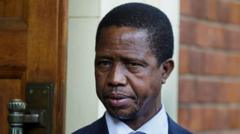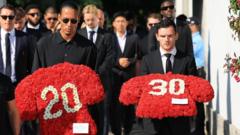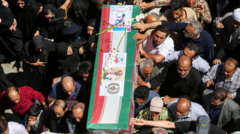The tussle over the body of former Zambian President Edgar Lungu, who passed away two months ago, has sparked a public controversy rife with debates over leadership, state authority, and family wishes, underlining deep political divisions in the country.
The Controversial Aftermath of Zambia's Leadership: Edgar Lungu's Burial Dispute

The Controversial Aftermath of Zambia's Leadership: Edgar Lungu's Burial Dispute
Zambia faces a public uproar over the remains of former President Edgar Lungu as political tensions mount around his burial, with implications for governance and national unity.
The controversy surrounding the burial of former Zambian President Edgar Lungu has escalated into a heated public and political dispute, revealing deep-seated tensions within the country’s political landscape. Lungu, who passed away two months ago while receiving treatment in South Africa, is at the center of a legal battle after a court ruling allowed the Zambian government to repatriate his body for a state funeral, despite opposition from his family.
The ruling ignited celebrations among supporters of the ruling party, who cheekily adopted the phrase "It's coming home," historically tied to English football fandom, reflecting a controversial victory they perceive in the ongoing wrangling. In stark contrast, Lungu's family, who fear their wishes are being disregarded, voiced their anguish through emotional outbursts—particularly Lungu's sister, Bertha, who angrily chastised government officials in court, encapsulating the family's distress over the proceedings.
The discord stems from historical grievances between Lungu and his political rival, President Hakainde Hichilema, who defeated Lungu in the recent presidential elections. Allegations of persecution and accusations of political witchcraft have emerged, underscoring the complex dynamics at play. The family accuses Hichilema’s administration of vendetta, asserting that Lungu wished for the incumbent president to have no role in his burial.
Despite the family's claims, the Zambian government resolutely contends that Lungu deserves a state funeral aligned with national protocols governing former presidents. With a legal appeal underway, the Lungu family’s desire for a dignified burial without government interference clashes with official mandates, suggesting that the state may proceed with the burial regardless of familial consent.
Critics, including historians and political analysts, argue the situation mirrors broader societal grievances, contending that the government’s actions are not merely about giving Lungu a respectful send-off, but are deeply intertwined with ongoing political calculations and power struggles. This fraught context is compounded by local cultural sensitivities, as some citizens speculate on the motives behind the government's perceived urgency in obtaining Lungu's remains.
The zany verbiage of “coming home” only amplifies the disarray, drawing attention not only to the former president's final resting place but also to the underlying schism in Zambian society. With the outcome still uncertain, many observers anticipate that this spectacle—rooted in grief and governance—will continue to unfold, keeping the nation embroiled in an emotional and political quagmire.





















